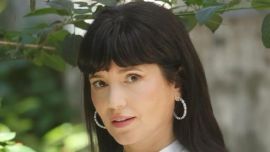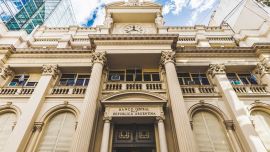As soon as hedge fund veteran Hans Humes heard the shock result from Argentina’s primary on August 11, he began scouring the web for airline tickets.
He’s one of the dozens of investors who flocked to Buenos Aires to meet the opposition leaders now likely to take over the country, some desperate to salvage beaten-down investments and others sniffing opportunities after the sell-off.
Since then, money managers including BlackRock Inc., Pacific Investment Management Co., Goldman Sachs Group Inc. and others have huddled with advisers to opposition candidate Alberto Fernández or spoken with them over the phone. The message from at least one of those campaign aides, Emmanuel Álvarez Agis, the former deputy economy minister under the populist government of Cristina Fernández de Kirchner, was surprisingly encouraging.
“It seemed to me he has a good sense of how they will need to thread the needle to nail the election, but not spook markets,” said Humes, the chief executive officer of Greylock Capital in New York. Even supporters of President Mauricio Macri “spoke highly of him.”
Investors need plenty of reassuring. After Fernández’s landslide win, the peso plunged to a record low, stocks suffered the second-biggest slide in 70 years and credit-default swaps signaled a greater than 75 percent chance of default over five years.
While Fernández has struck a more moderate tone, many investors remain wary of the fact that Cristina Fernández de Kirchner is on the ticket, her former economy minister Axel Kicillof is set to win governor of the most important province and that the list for lawmakers of the opposition is stacked with members of the more radical left-wing grouping known as La Campora.
For all of Álvarez Agis’ charm, he was a member of a government which enacted capital controls and defaulted on debt as part of a stand-off with holdout creditors.
But now, as someone who could be a key member on the economic team by year-end, Álvarez Agis is telling investors what they want to hear. Like the need to maintain market access, maintain fiscal discipline and attract investment while not reneging on liabilities with bondholders or multilateral lenders like the International Monetary Fund, which gave Argentina a record US$56-billion loan last year.
Representatives at BlackRock, Pimco and Goldman declined to comment.
Moderate voice
Other advisers include Guillermo Nielsen, the 68-year-old former finance secretary under ex-president Néstor Kirchner, as well as Matías Kulfas and Cecilia Todesca. Fernández hasn’t formally said who would hold roles in the future cabinet or Central Bank if he wins the general election in October.
“What the market needs to hear is commitment to a fiscal anchor and an IMF programme,” said Siobhan Morden, a New York-based strategist at Amherst Pierpont Securities.
IMF officials are also in Buenos Aires this week for meetings with Macri’s government, as well as Fernández and his advisers, including Nielsen and Todesca. After an initial meeting on Monday, Fernández said he agreed with the main objectives of the IMF programme.
Stabilising markets
Days after the primary, when Fernández took a 15 percentage point advantage over Macri ahead of the October 27 election, Álvarez Agis hopped on a call set up by XP Investimentos with roughly 200 investors from New York to London. Alberto Bernal, XP’s chief strategist, said he was “pleasantly surprised.”
“The Fernández camp is proving to be very open to the conversation,” Bernal said. “I was not expecting this level of openness.”
Álvarez Agis has joined at least one other call with BTG Pactual and its clients. While he claims to advise Fernández but not yet represent him, he says that the frontrunner would have the final word on economic decisions, not his running-mate.
Returning calm
Since the brutal sell-off, Argentine markets have calmed down a bit. The peso halted its steep decline and yields on the nation’s century bonds ticked lower as Fernández pledged his government would not default or reimpose capital controls.
Fernández, who said last week that he’s getting calls from hedge funds and investors for meetings, met Monday with representatives of mining companies including Glencore Plc and Newmont Goldcorp.
Martín Castellano, who worked at the Central Bank under both Kirchner governments and is now a senior economist at the Washington-based Institute of International Finance, said there’s been increased demand for spots on a pre-planned IIF trip to the country next month.
“They’re eager to know the policies that could be in place next year,” Castellano said.
Economic advisers
- Emmanuel Álvarez Agis, 38, was deputy economy minister and undersecretary of economic programming between 2011 and 2015, when Axel Kicillof was minister. He participated in negotiations with some creditors (Paris Club, Icsid, holdouts) and took part in the 2014 issuance of Bonar 2024 bonds. He was a director on the boards of Banco Macro, Edenor, Pampa and Transener. He currently leads the consulting firm pxq.
- Guillermo Nielsen was finance secretary between May 2002 and November 2006, during the restructuring of 76 percent of Argentina’s debt (US$81.8 billion) in 2005, the biggest sovereign restructuring at the time. He worked at the Central Bank between January-April 2002, when Argentina announced that it would convert dollar deposits into pesos.
- Matías Kulfas, 47, was general manager of the Central Bank starting in 2012 at a period when Argentina imposed capital controls in the foreign exchange market. He was president of the Association of Economic Development of Argentina, a think tank close to Cristina Fernández de Kirchner and is a friend of former Central Bank president Mercedes Marco del Pont. He left his post when Juan Carlos Fabrega arrived to the Central Bank. Kulfas also previously served as director of state-run lender Banco de la Nacion.
- Cecilia Todesca served as chief-of-staff and deputy general manager of institutional relations at the Central Bank. Previously, she held various technical positions in the Economy Ministry and was senior advisor for Argentina in the Southern Cone chair at the IMF in Washington.
by Ben Bartenstein & Sydney Maki, Bloomberg / with assistance from Ignacio Olivera Doll and Carolina Millan.
























Comments